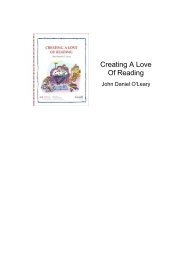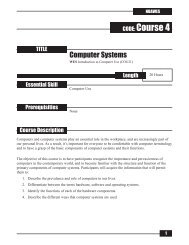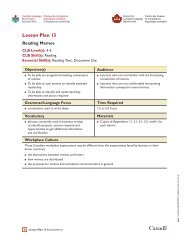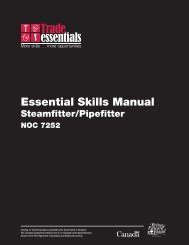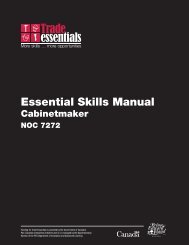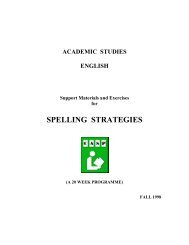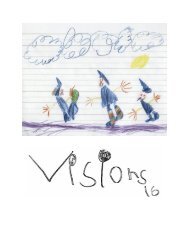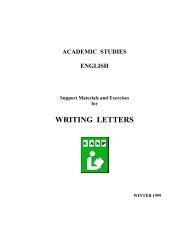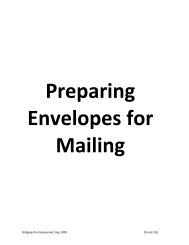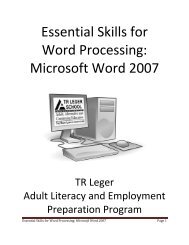Essential Skills - National Adult Literacy Database
Essential Skills - National Adult Literacy Database
Essential Skills - National Adult Literacy Database
Create successful ePaper yourself
Turn your PDF publications into a flip-book with our unique Google optimized e-Paper software.
<strong>Essential</strong> <strong>Skills</strong> and the Northern Oil and Gas Workforce Final Report and Resource Guide<br />
What Are <strong>Essential</strong> <strong>Skills</strong> and Why Are They Important?<br />
<strong>Essential</strong> skills are skills that have been identified as being required in almost every<br />
occupation. They are often referred to as the Velcro to which other training sticks. In other<br />
words, they are the foundation upon which occupation-specific skills are built.<br />
<strong>Essential</strong> skills are also:<br />
• enabling skills that help people perform tasks required by their jobs<br />
• skills which allow workers to learn new skills<br />
• skills which enhance a worker’s ability to adapt to workplace change<br />
• skills necessary to use printed and written information to perform competently in a<br />
workplace and to develop one’s knowledge and potential<br />
• basic skills that help workers to fulfill their individual and collective potential at work, at<br />
home, in the union, and in the community<br />
• generic skills required by most workplaces in the country<br />
• the skills that help you to keep a job<br />
• the “academic” skills that individuals require on a daily basis<br />
Human Resources <strong>Skills</strong> Development Canada has identified nine essential skills. They are:<br />
1. reading text<br />
2. using documents<br />
3. writing<br />
4. numeracy<br />
5. oral communication<br />
6. thinking skills<br />
including:<br />
• critical thinking<br />
• problem solving<br />
• decision making<br />
• job task planning<br />
and organizing<br />
• significant use of<br />
memory<br />
• finding information<br />
7. working with others<br />
8. computer use<br />
9. continuous learning<br />
Specific examples of essential skills include:<br />
• reading and responding to an email • scheduling daily activities<br />
• writing in a logbook • measuring angles<br />
• reading instructions in a manual • interpreting WHMIS symbols<br />
• interpreting a blueprint • completing an expense claim<br />
• making a call to a supplier • calculating square footages<br />
• reading a collective agreement • doing a cost estimate for a job<br />
• converting metric measurements to<br />
Imperial<br />
Without adequate essential skills learners and workers are less able to acquire new<br />
knowledge, adapt to workplace change and participate fully in the community, local<br />
workplace or larger economy.<br />
W W<br />
7




